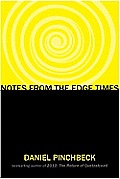
I am in Denver today, where I spoke on a late night talk radio show on Clear Channel, before my bookstore appearance here tomorrow night. The topics we covered in the show included large, complex systems — such as the global financial system — and what happens when they collapse. The host of the show said that he had a "pessimistic" perspective, looking over history as a series of failures leading to wars and revolutions. I said that my approach was to think of history from a design science point of view: The designer develops a prototype in the laboratory, and watches it work for a while until it breaks down, then builds a new model to address the flaws of the old one. Governments, political and economic systems are, in a sense, experiments in human social design where we explore different ways to make these odd, alienated little units of individual consciousness collaborate and work together for the greater good. Although the wreckage from past experiments have been costly in terms of human lives and suffering, it is also not surprising we haven't gotten it right yet. The human species hasn't been at it very long.
Recently, friends of mine (James Mathers, Paradox, and Raven of Datrium) have been focusing on one metaphor for the type of transformation we appear to be facing as a species: The transition from caterpillar to butterfly. Once the caterpillar is in the cocoon, the entire body of the caterpillar melts down entirely into jelly and a small group of what are called "imaginal cells" propagate the genetic information that leads to the reorganization of this mass into a butterfly. These imaginal cells are attacked by the caterpillar's immune system as a threat, but are able to distribute their DNA to ever-larger groupings of cells, until a new instruction code is introduced. In this transmutation, the insect goes from rapacious consumer to elegant pollinator, and is lifted off the earth by gaining the added dimension of flight.
Many people have used the term "dimensional shift" to describe what we may experience on a species level as we pass through the 2012 portal or transition from the Hopi's Fourth to Fifth World. I sometimes find all of this to be maddeningly abstract and indistinct. What do we mean by "dimension?" However, the caterpillar to butterfly metaphor is interesting because in this mutation, the caterpillar actually gains a literal extra dimension of vertical movement, and no longer needs to crawl.
If we were reliably able to access one extra sensory capacity, that in itself might qualify as a shift of "dimension" — for instance, if we became capable of coherent telepathic rapport, or suddenly evolved to perceive another spectrum of color or light. These types of new perceptual modalities can occur temporarily during psychedelic journeys — it is conceivable that these aspects of the psychedelic experience are a kind of harbinger or indicator of some kind of transition that will be accessible to the wider species mind, at a certain juncture. The evolution of more refined sensory capacities is still mysterious. Some theorists argue that our ability to perceive the entire range of colors we now see only occurred within the last ten thousand years, and before that green and blue were indistinguishable. If this was the case, it would have been more like a quantum jump as a species rather than a trait developed through standard evolutionary models. The evolution of language is another similar conundrum for scientists and theorists, as I discussed in my 2012 book.
Perhaps it is possible if, as I have theorized in previous works, we are transitioning from the physical to the psychic phase of our evolution as a species, a range of modifications of our sensory mechanisms and biological organism could become almost simultaneously available to us or our immediate descendants. In a sense, the evolution of biotechnology — which often seems to me to be threatening and potentially dehumanizing — might instead be revealed as a logical advance of our natural evolution. As Barbara Marx Hubbard notes, "conscious evolution" is the "evolution of evolution, from unconscious to conscious choice." Perhaps in the end the dualistic divide between technology and nature will be superseded entirely, as we graduate to the next phase of conscious life accompanied by a liberated capacity for transforming the physical organism.
It is hard to decide whether such a development is desirable or repugnant — perhaps it is both.